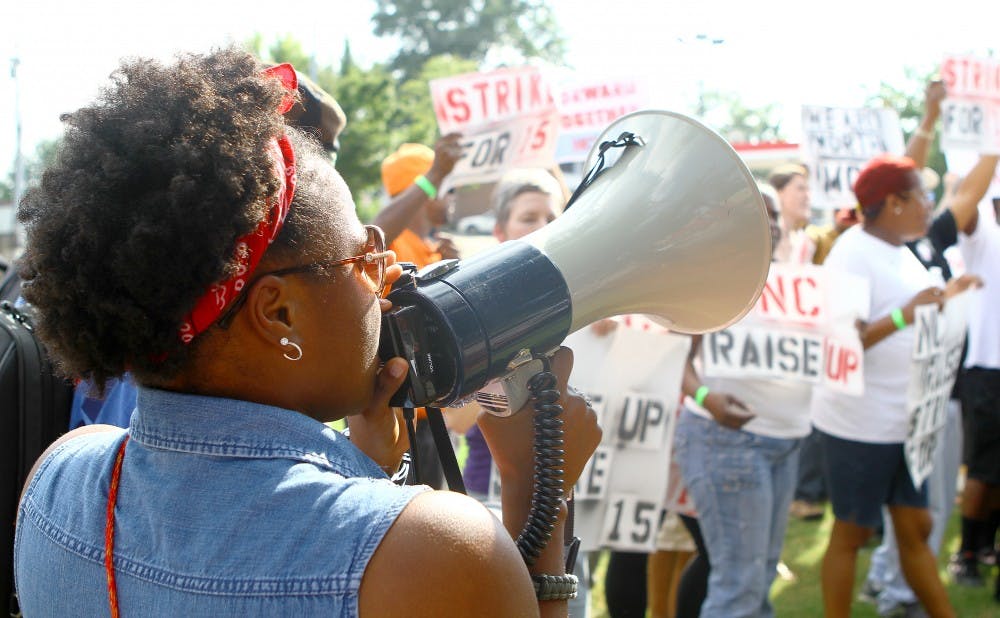Thousands of fast food workers walked off the job Thursday, demanding higher wages and union representation and, for many of Duke's fast food employees, the demonstration hit close to home.
The walkouts—which took place in Durham and more than 150 other cities across the nation—were part of a two-year national campaign to raise fast-food wages to $15 per hour, more than double the current federal minimum wage of $7.25. Across the country, hundreds of protestors participated in sit-ins and marches, and nearly 500 were arrested, including one congresswoman. In an event organized by southern workers' association Raise Up for 15, Durham protestors blocked traffic on Morgan and West Main streets for three hours before local police arrested 26 participants.
“No one, no matter where they live, can live on a minimum wage of $7.25,” said MaryBe McMillan, secretary-treasurer of North Carolina's division of The American Federation of Labor and Congress of Industrial Organizations. “This is already a poverty-level starvation wage.”
The North Carolina minimum wage currently matches the federal minimum of $7.25 per hour, which has been criticized as an unlivable wage by fast-food employees and academics alike.
Although the financial situation varies between people with and without families to support, most of his friends and family employed in the fast-food industry were “struggling,” said Patrick Hatch, an employee of the Au Bon Pain on Duke's campus.
“It doesn’t match up with the cost of living or the amount of labor,” said fellow ABP employee Rynequa Carthorne, who suggested $18 to $20 per hour as a reasonable wage for a single-person household.
Edgar Santos, an employee at the McDonald’s in the Bryan Center, said he knew workers who had been employed at the Duke McDonald’s for seven to nine years but were still making $9 per hour. Even then, the wage is higher than that paid by other restaurants in the chain because the cost of food is slightly more expensive at the University, he said.
Santos noted that participating in the strike came with risks.
“Let’s say you walk off the job—you’ll lose a job, you’ll lose money,” he said. “Say you find somewhere else to work. [If] you find a job at Wendy’s, it’ll be the same thing.”
A higher wage for fast-food workers would have implications that extend beyond the fast-food industry, McMillan said.
“Someone shouldn’t work 40 hours a week and still live in poverty,” she said. “It hurts everyone, because those workers have to then live on public assistance.”
Increasing wages would “raise the floor” for all workers, McMillan said.
North Carolina’s minimum wage rose from $6.55 to $7.25 in 2009, in accordance with the new wage floor set by the Fair Minimum Wage Act. A Public Policy Polling report indicates that 58 percent of state voters approve of raising the minimum wage to $10 per hour. Efforts to increase the current minimum wage from $7.25, however, have received little support from legislators. A senate bill which proposed indexing the state minimum wage to inflation was introduced in the state legislature last year, but no hearings were conducted on it.
If the minimum wage is not adjusted for inflation, then the value of the minimum wage actually drops as prices rise, said Anna Gassman-Pines, an assistant professor of public policy. She added there was “no doubt” that raising the minimum wage would help workers and their families.
“From the best data that we have, increasing the minimum wage would help workers and would not really have many negative effects on other stakeholders,” Gassman-Pines said.
She noted, however, that significant changes to the current minimum wage were unlikely to be made in North Carolina—a state where resistance to the federally-mandated minimum wage has traditionally been strong.
In addition to higher wages, unions are pushing for more accountability on the part of fast-food corporations.
Most fast-food workers are employed by local franchise restaurants rather than the corporations that own the restaurants’ brand. Local franchise owners are responsible for paying workers and managing the day-to-day activities of the restaurant. Despite this, corporations are able to regulate workers’ wages and working conditions. As a result, the corporations retain control over employees without shouldering liabilities as legal employers.
“The fact we saw so many fast-food workers willing to walk off the job is a real sign workers in North Carolina and in the South have had enough,” McMillan said.
Get The Chronicle straight to your inbox
Signup for our weekly newsletter. Cancel at any time.

